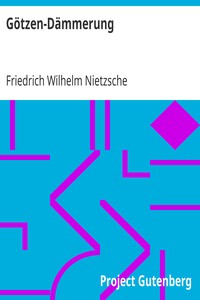Götzen-Dämmerung by Friedrich Wilhelm Nietzsche
"Götzen-Dämmerung" by Friedrich Wilhelm Nietzsche is a book written in 1888 and published in 1889. In this fierce philosophical work, Nietzsche launches a radical attack on cultural idols and philosophical traditions. He criticizes German, French, English, and Italian culture as decadent, while championing figures like Caesar and Napoleon as stronger types. The book takes particular aim at Socrates and his rational philosophy, arguing that reason opposes instinct and vitality. Nietzsche presents his
project of revaluing all values and declares war on what he sees as life-denying philosophies. (This is an automatically generated summary.)
Read or download for free
| How to read | Url | Size | |||
|---|---|---|---|---|---|
| Read now! | https://www.gutenberg.org/ebooks/7203.html.images | 208 kB | |||
| EPUB3 (E-readers incl. Send-to-Kindle) | https://www.gutenberg.org/ebooks/7203.epub3.images | 151 kB | |||
| EPUB (older E-readers) | https://www.gutenberg.org/ebooks/7203.epub.images | 154 kB | |||
| EPUB (no images, older E-readers) | https://www.gutenberg.org/ebooks/7203.epub.noimages | 132 kB | |||
| Kindle | https://www.gutenberg.org/ebooks/7203.kf8.images | 274 kB | |||
| older Kindles | https://www.gutenberg.org/ebooks/7203.kindle.images | 264 kB | |||
| Plain Text UTF-8 | https://www.gutenberg.org/ebooks/7203.txt.utf-8 | 190 kB | |||
| Download HTML (zip) | https://www.gutenberg.org/cache/epub/7203/pg7203-h.zip | 151 kB | |||
| There may be more files related to this item. | |||||
Similar Books
About this eBook
| Author | Nietzsche, Friedrich Wilhelm, 1844-1900 |
|---|---|
| Title | Götzen-Dämmerung |
| Note | Wikipedia page about this book: en.wikipedia.org/wiki/Twilight_of_the_Idols |
| Credits | This text has been derived from HTML files at "Projekt Gutenberg DE" |
| Reading Level | Reading ease score: 68.9 (8th & 9th grade). Neither easy nor difficult to read. |
| Language | German |
| LoC Class | B: Philosophy, Psychology, Religion |
| Subject | Philosophy, German |
| Category | Text |
| EBook-No. | 7203 |
| Release Date | Jan 1, 2005 |
| Most Recently Updated | Dec 30, 2020 |
| Copyright Status | Public domain in the USA. |
| Downloads | 1383 downloads in the last 30 days. |
| Project Gutenberg eBooks are always free! | |

